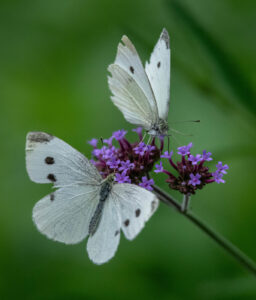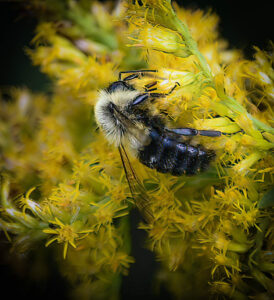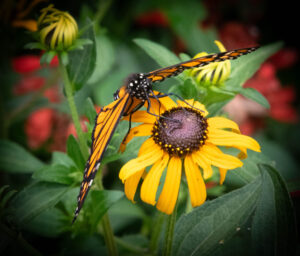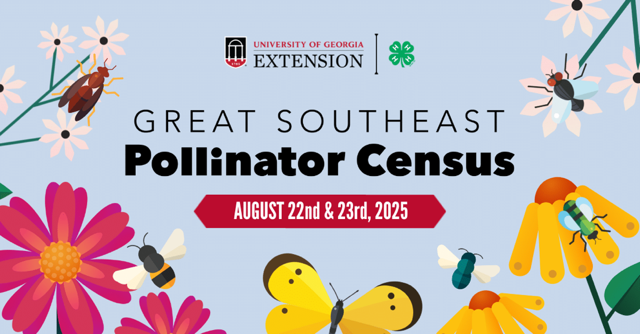Without pollinators, people and earth’s environment would be in jeopardy. Of the 1,400 crop plants grown around the world, those that produce all our food and plant-based industrial products, almost 80% require pollination by animals. Visits from bees and other pollinators also result in larger, more flavorful fruits and higher crop yields. We have pollinators — such as bees, butterflies, birds, and bats — to thank.

Humans depend on plant pollination for many resources, including much of the food we eat. A dessert such as chocolate-covered strawberries requires pollination of strawberry plants by bees and cacao trees by flies. Medicines are derived from animal-pollinated flowering plants or developed to mimic compounds discovered in plants. Cotton used in clothes is made from the fluff on the seeds of plants that were bee pollinated.

A pollinator is any creature that helps carry pollen from one flower to another, allowing the plant to become fertilized and produce fruit, seeds, and young plants. While some plants are self-pollinating or rely on the wind or water to do pollination, around 75% of the flowing plants on earth are pollinated by insects, birds, and mammals. Many of these plants are important for our food, medicine, fuel, or fiber. Most people are familiar with bees and butterflies as pollinators, but moths, flies, beetles, birds, and even some small mammals can be pollinators.

Many pollinators are declining due to habitat loss, disease, and contamination.
You can help!
- Maintain snags, where it is safe to do so, in wooded areas. Many native pollinators use these for cover and nesting.
- Maintain native vegetation clumps in odd/unused areas of the landscape. Mow these areas in the early spring. Leave standing vegetation through the winter. Some native pollinators overwinter in the hollow stems of this vegetation. Avoid disturbing the soil in these areas since many native bees nest underground.
Another way you can help is to participate in the Great Southeast Pollinator Census. It is a citizen science project created by the University of Georgia. This project is designed for everyone to participate and influence pollinator conservation! On 22 and 23 August 2025, citizen scientists will spend 15 minutes observing a pollinator on a plant and reporting it. Georgia, South Carolina, North Carolina, Florida, and Alabama will participate.

Resources:
- Check out https://gsepc.org/,
- Download the printable Counting Sheet
- Check out the Insect Counting & Identification Guide
- Join the Southeast Pollinator Census Facebook page and follow the Instagram @SoutheastPollinators.
- View The Pollinator Census—How-To and History
- https://youtu.be/LNgrSzuGRQc
Teachers
The Census is a great S.T.E.A.M. activity that you can use in your classroom through a variety of approaches:
- Science – introducing science topics including entomology, biology, ecology and botany through our lesson plans and resources below.
- Technology – uploading counts to the webpage, joining our Great Southeast Pollinator Census Facebook group and sharing on social media
- Engineering – creating bee homes and designing pollinator gardens.
- Art – drawing diagrams of pollinators and gardens, creating insect and flower origami, writing pollinator poetry, and pollinator journaling.
- Math – counting down the days to the census beforehand, counting insects with our counting forms the day of, comparing counts with other students and creating graphs of insects seen.
Check out https://gsepc.org/educators/ for more information.
We encourage school groups, gardeners, families, and individuals to be a part of the project. You do not need to be an entomologist; we ask for only basic insect identification into these categories:
- Bumble bees
- Carpenter bees
- Honeybees
- Small bees
- Wasps
- Flies
- Butterflies/Moths
- Other Insects
The project is designed to be easy enough for anyone to learn basic entomology and participate while at the same time ensuring that we are generating useful data.
The author of this article, Phillip Prichard, is a Paulding UGA Extension Master Gardener, Birds Georgia – Master Birder, and a UGA Master Naturalist, trained to provide education for homeowners on horticulture, sustainable landscaping, and environmentally friendly gardening practices using unbiased, research-based information from the University of Georgia. For more information, contact Paulding County UGA Extension at 770-443-7616 or view our online resources at www.ugaextension.org/paulding.